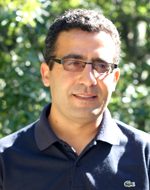Dr. Yousef Ghorbani

Camborne School of Mines - University of Exeter
Project leader and director for OptimOre, a collaborative European Horizon 2020 at the Camborne School of Mines, College of Engineering, Mathematics & Physical Sciences (CEMPS), University of Exeter (May 2015-Present). 2013-2015: Assistant Professor-Metallurgy and Mining Engineering Department-UCN, Chile. 2012-2013: Postdoctoral research fellow-Department of Chemical Engineering, University of Cape Town. 2009-2012: PhD in Extractive Metallurgy-Department of Chemical Engineering University of Cape Town, Cape Town, South Africa. 2006-2009: Lecturer at the Mining Engineering and Mineral Processing-Sahand Industrial University, Iran. 2005-2006: Project manager and superintendent at the Atomic Energy Organization of Iran (AEOI). 2003-2005: Project Manager and chief engineering officer at the Iranian Research Institute for Mineral Applications, Tehran, Iran.
Main research interests are: Understanding the factors that drive and limit extractive metallurgy. Emerging trends in Mineral Processing and Hydrometallurgy. The process development and implementation of industrial and critical minerals. Physical Properties of mineral slurries such as Rheological, Thermal and Transport properties. Integrated social, economic and environmental aspects of Mining impacts. Bio-remediation of the acid mine drainage.
Overview of OptimOre project progress as first EU project on raw materials
Modern economy is highly dependent on specific raw materials, and it is envisaged that this dependency will increase in the near future. Most of them are scarce in the European Union (EU) and of poor purity, being mixed within complex and low grade aggregates which need to be processed by means of a separation process consuming high quantities of energy and water, and even in some cases this makes its exploitation unfeasible due to production costs. Being EU dependent on some of these materials, as identified by the European Innovation Partnership (EIP) initiative, our society is demanding more efficient extracting processes to contribute to major European independency on these Critical Raw Materials (CRMs). Tungsten and Tantalum ores are two recognized CRMs: In a market currently dominated by China and Russia production (among others), in Europe Tungsten (limited) production is mostly concentrate into UK, Spain and Portugal. On the other side, Tantalum is a key element on electronics with clear EU external production dependency, as it is naturally really scarce in Europe (only 1% of world production is concentrated in EU). Knowing this situation, OptimOre Project as a first EU project on raw materials has started a comprehensive research and development of modelling and control technologies in order to study the secure sustainable supply of raw materials (Tungsten and Tantalum) to the European economy whilst increasing benefits for society as a whole. The approach to do this was based on, using advanced sensing and industrial control, artificial intelligence techniques, aiming to increase yield in 7-12% on the current best production processes and increasing energy saving on a 5% compared to the best available techniques. This work consist of 8 partners in 4 different countries and 7 advisory board from industry.
In talk will present industrial impact development approach in OptimOre project introducing a general techno-economic impact of this project. Number of the successful non-disclosure agreement (NDA) with different relevant companies in Europe have been discussed.
